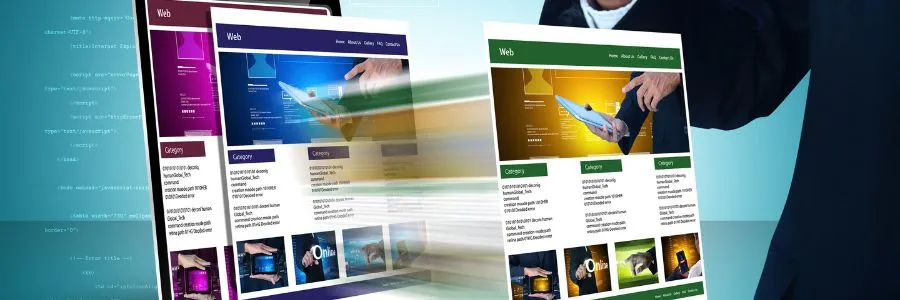1. Assess Your Needs and Goals
Define the Purpose of Your Website
- Determine the primary objectives of your website (e.g., e-commerce, informational, portfolio).
- Identify the target audience and their specific needs.
Determine the Features and Functionalities Required
- List the essential features such as contact forms, e-commerce capabilities, blogs, or booking systems.
- Consider future scalability and potential integrations (e.g., CRM systems, social media).
Set a Clear Budget and Timeline
- Establish a realistic budget for the entire project, including design, development, and maintenance.
- Outline a timeline with key milestones and a final launch date.
- Prioritize features to ensure critical elements are developed within budget and time constraints.
2. Research and Shortlist Potential Companies
Look for Companies with a Strong Online Presence and Portfolio
- Search for website development companies in Mumbai with a solid online reputation.
- Visit their websites to review portfolios showcasing their design and development work.
- Ensure their style aligns with your vision and brand aesthetics.
Check Client Reviews and Testimonials
- Read client reviews on platforms like Google, Clutch, or industry-specific forums.
- Look for testimonials on the company’s website to gauge customer satisfaction.
- Contact past clients if possible to get firsthand feedback on their experiences.
Identify Companies with Experience in Your Industry
- Shortlist companies that have worked on projects similar to yours.
- Evaluate their understanding of industry-specific requirements and challenges.
- Ensure they can provide tailored solutions that meet your unique needs.
3. Evaluate Technical Expertise and Services
Assess the Company's Technical Skills and Development Capabilities
- Ensure the company has a proficient team of developers with expertise in various programming languages (e.g., HTML, CSS, JavaScript, PHP, Python).
- Check their experience with different content management systems (CMS) like WordPress, Joomla, or custom CMS solutions.
- Inquire about their proficiency in responsive and mobile-first design.
Ensure They Offer Comprehensive Services
- Verify if the company provides end-to-end services including web design, development, SEO, and ongoing maintenance.
- Check if they offer UX/UI design to ensure a user-friendly interface.
- Confirm their ability to handle hosting, domain registration, and SSL certification.
Check Their Proficiency in the Latest Technologies and Trends
- Ask about their familiarity with modern development frameworks and tools (e.g., React, Angular, Vue.js).
- Ensure they stay updated with the latest web development trends and best practices (e.g., Progressive Web Apps, AMP, AI integrations).
- Evaluate their approach to website performance optimization, security measures, and accessibility compliance.
4. Examine Previous Work and Case Studies
Review Their Portfolio to Assess Quality and Variety
- Analyze the design aesthetics and functionality of websites in their portfolio.
- Look for diversity in project types and industries they have served.
- Ensure the portfolio demonstrates their ability to create websites that are visually appealing and user-friendly.
Analyze Case Studies to Understand Their Problem-Solving Approach
- Review detailed case studies that outline the challenges faced, solutions provided, and results achieved.
- Look for examples where the company has tackled complex projects or unique requirements.
- Assess their ability to innovate and provide customized solutions.
Look for Examples of Websites Similar to What You Envision
- Identify portfolio pieces or case studies that closely match the type of website you want.
- Evaluate their experience in creating websites with similar features and functionalities.
- Ensure they understand the specific needs and preferences of your target audience.
5. Consider Communication and Support
Evaluate Their Responsiveness and Communication Skills
- Assess how promptly they respond to your initial inquiries and follow-ups.
- Ensure they communicate clearly and effectively, explaining technical details in an understandable way.
- Check if they assign a dedicated project manager or point of contact for seamless communication.
Ensure They Offer Reliable Post-Launch Support and Maintenance
- Inquire about their post-launch support services, including bug fixes, updates, and backups.
- Check if they offer maintenance plans to keep your website secure and up-to-date.
- Confirm their availability for ongoing support and how they handle emergency issues.
Check If They Provide Clear Documentation and User Training
- Ask if they provide comprehensive documentation for the website, including technical specifications and user guides.
- Ensure they offer training sessions to help you and your team manage and update the website.
- Verify if they provide resources or tutorials for common tasks and troubleshooting.
6. Review Pricing and Contract Terms
Compare Pricing Models and What is Included in Each Package
- Request detailed quotes from shortlisted companies, breaking down costs for design, development, and additional services.
- Compare pricing structures (fixed price, hourly rates, retainer fees) and what each package includes.
- Look for transparent pricing to avoid unexpected costs.
Understand the Terms of the Contract, Including Payment Schedules
- Carefully review the contract terms, ensuring all project details, deliverables, and timelines are clearly stated.
- Clarify payment schedules and terms, such as upfront deposits, milestone payments, and final payments.
- Ensure there are clear terms for any scope changes or additional work beyond the initial agreement.
Look for Any Hidden Costs and Clarify All Financial Aspects Upfront
- Inquire about potential additional costs for things like third-party integrations, premium plugins, or stock images.
- Clarify if there are any ongoing costs for maintenance, hosting, or updates.
- Ensure all financial aspects are discussed and agreed upon before signing the contract.

